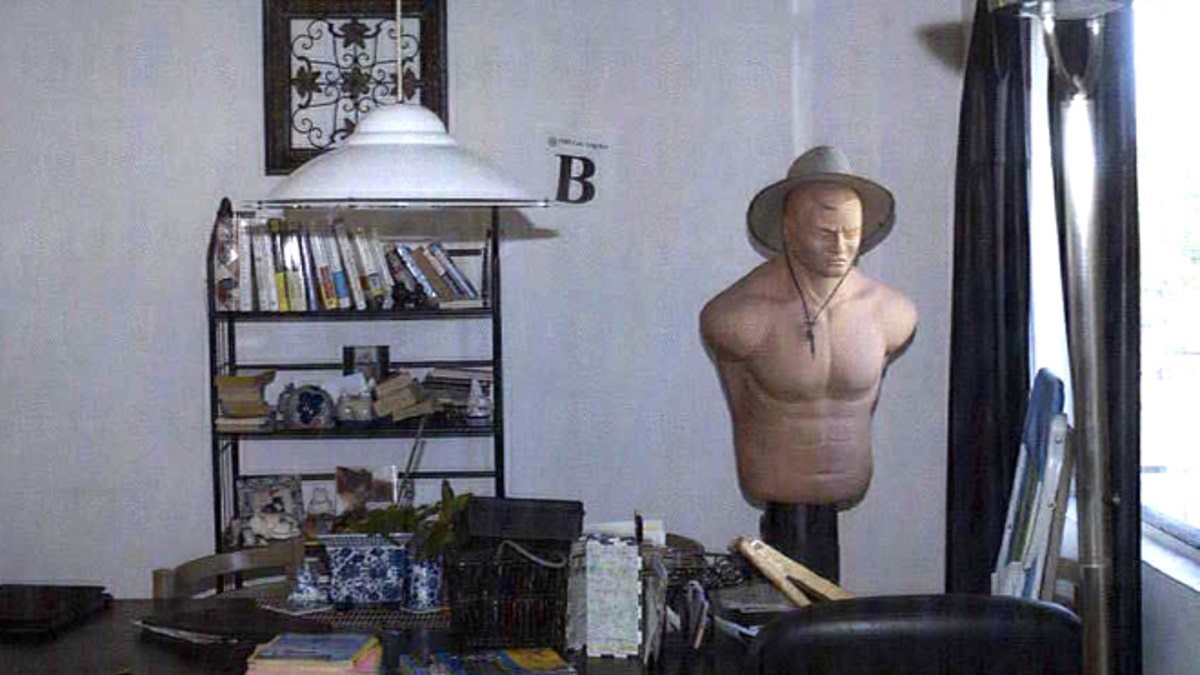
This photo provided by the U.S. Attorney's office shows inside James "Whitey" Bulger and Catherine Greig's apartment at the Princess Eugenia complex, in Santa Monica, Calif. (AP/US Attorney's Office)
BOSTON – When authorities searched the apartment of Boston gangster James "Whitey" Bulger, they found $822,000 in cash and a large collection of guns hidden in holes cut into the walls.
Other than the cash, there were few valuables. Books, hats, sweatshirts and household items bought at discount stores filled the rent-controlled Santa Monica, Calif., apartment the notorious crime boss shared with his longtime girlfriend while he was on the run.
But authorities are hoping they can attract buyers for Bulger's belongings so they can compensate his victims.
Bulger's possessions will be sold to the highest bidders during a criminal forfeiture auction expected to be held over the next few months.
Prosecutors in U.S. Attorney Carmen Ortiz's office are now trying to decide which of Bulger's belongings should be auctioned. They are trying to balance their desire to compensate relatives of Bulger's murder victims with avoiding glamorizing Bulger or his crimes and staying within the boundaries of good taste.
"We want to certainly be able to obtain funds to go back to the victims who were harmed by Bulger, but we don't want to do that in a way that glorifies Bulger or potentially causes some offense to the victims or others who have been impacted by Bulger," said Assistant U.S. Attorney Mary Murrane.
Bulger was convicted in August of orchestrating or participating in 11 killings during his reign as leader of the Winter Hill Gang. He was sentenced to two life terms plus five years in prison. The cash and proceeds from the auction will be split among the estates of murder victims who choose to participate and several extortion victims.
There are a few things likely to bring in a substantial amount of money, including a gold and diamond claddagh ring with an estimated appraised value of $48,000, a replica of a 1986 Stanley Cup championship ring and a 40-inch flat-screen TV.
But most of the items found in the apartment Bulger shared with Catherine Greig are ordinary things that have no intrinsic value. Authorities are hoping they could appeal to crime memorabilia collectors or other buyers.
There's a rat-shaped cup used to hold pens and scissors, a collection of books about the mob and Bulger's gang, an assortment of cat figurines and "Soldier of Fortune" magazines. There are also Valentine's Day and Christmas cards Greig sent to Bulger.
Authorities haven't yet decided whether personal items should be auctioned, Murrane said.
"It's looking at those items that on their own don't have value and which of those would be appropriate to auction, knowing that they would sell only because of who owned them," she said. "It's definitely a question of balance."
Families of Bulger's victims have mixed feelings about the upcoming auction.
Bulger was convicted of gunning down Patricia Donahue's husband, Michael, in 1982 while targeting a different man who offered him a ride home that night. She said she isn't opposed to the auction.
"I can't imagine anybody wanting his things, but if they can sell them and make money and give the money to the victims, I think that's great. I'm sure a lot of the victims can use the money," she said.
But Steve Davis said he doesn't like the idea of an auction. The jury was unable to reach a decision on whether Bulger was responsible for his sister Debra Davis' death.
"I wish they would burn everything right in front of all of us," Davis said. "They should just destroy everything. That would kill the memories we have of him."
Thomas J. Abernathy, assistant chief inspector of the asset forfeiture division of the U.S. Marshals Service, said the program has two goals: to compensate victims and to deter future criminal activity.
"It's a very important piece of the law enforcement process. Compensating victims is paramount in our program," he said.
Auctions in other high-profile cases have brought in millions.
The U.S. Marshals Service, which is responsible for selling seized and forfeited properties, raised $232,000 through a 2011 online auction of Ted Kaczynski's belongings, including 20 personal journals and the hooded sweatshirt and sunglasses depicted in his famous FBI sketch.
A two-day auction in Miami in 2011 brought in $3.2 million in the case of convicted financier Bernard Madoff to compensate victims of his $65 billion Ponzi scheme. The sales included fine jewelry, coins and even 14 pairs of Madoff's underwear.
Rich Kroll, an online retailer who bought some of Madoff's clothing at the auction, said he thought Madoff's status would attract buyers, but he doesn't expect Bulger's possessions to draw much interest.
"Madoff was more of a celebrity. Bulger was a downright killer," he said. "I don't even want anything of his."
Bulger, now 84, fled Boston in 1994 after being tipped by a former FBI agent that he was about to be indicted. He was finally captured with Greig in 2011.

